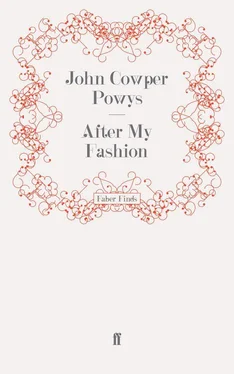Those little flickering candle flames at which he stared seemed a signal to him that he in his turn had to wrestle with the Figure made of darkness and the shadow of death, until he or It cried ‘hold, enough!’ And what he felt most clearly just then was that the secret the clue, the sign — whatever it might be — of the thing which lay hidden under the phantasmagoria of life was something that was less involved, less connected, less fatally mixed up, with the evil and the good and the sweet and the bitter, than in the pell-mell of existence one was apt to hold.
What he felt at that moment was a profound craving to put into such magical words that nothing could destroy them the idea that there was some ultimate vision of things that could be reached by humanity, from the ground of which one was saved both from fear and remorse and from the fret and the fever of this perpetual choice and rejection.
He was startled out of his meditations by a sudden unexpected creaking of woodwork somewhere in the church. At first he fancied it was just that automatic relaxing of some old bench or board which one often may hear in a hollow-echoing place where the slightest sound is distinct. It ceased as suddenly as it had come. But a second afterwards it recommenced. This time he leapt to his feet and realized what it must be. It must be the secretive steps of some light-footed person trying to descend unnoticed from the organ loft. His entrance into the building had evidently surprised and caught some organ player who being reluctant to play to an unknown auditor was endeavouring to slip out of the church unobserved.
Richard moved hurriedly up the aisle, went to the altar and blew out the two candles. Then returning to the shelter of the great chancel arch he paused and waited, in as indifferent and negligent a pose as he could assume, for the emergence of this shy prisoner.
He could not help smiling to himself rather mischievously when he remembered the enormously stiff and heavy bolt he had drawn across the door. But perhaps this embarrassed organ-player possessed the key to some other exit. He seemed to have alarmed the invisible one into petrified stillness by his expectant attitude. Evidently the idea in the prisoner’s mind was that this lighter of candles would leave the church at once now that his little ceremony was concluded. It gave Richard quite a quaint and pleasing sensation to think that he had bolted himself in with a mysterious unknown who was now too shy to appear. ‘It must be a girl,’ he said to himself.
The footsteps became suddenly impetuous and daring. The final stages of the descent were accomplished in something resembling a precipitous rush to escape; and a slender feminine figure emerged into view. With the quickest possible glance at Richard as he stood motionless under the arch, she slipped away down the aisle. She’ll never move that bar , he thought, remembering the violent force with which he had run it through its rusty groove.
He was quite right. She was unable to make the thing stir an inch.
He recognized that it was incumbent upon him to open it for her and he moved down the aisle feeling as if he were going to let loose a bird or a butterfly that might hurt itself by its blind beatings against the obstacle.
She heard his steps behind her and turned round. ‘Allow me to do it,’ he said and moved to her side. But before he had touched the bolt there came a violent rattling and shaking of the door from the outside.
With an irresistible movement of contrariness he drew back, and the girl and he stared at one another in a sort of confederacy of hesitation. Then she smiled with the frank amusement of youth at the incongruity of the situation. ‘Someone wants to get in,’ remarked the girl. He looked into her eyes and realized how full of mischievous amusement she had become. It was clear too that she liked the look of her unwitting captor. She suddenly became grave and moved a few paces away from the bolted door. They stared at one another with renewed interest. Then, with a quick nervous little gesture she rested her bare hand on the edge of the font. ‘I saw you light those candles,’ she whispered. ‘I wanted you to do something.’ He now found his voice. He thought to himself, If she had said nothing about the candles it would have been better. Why must women always say something about things like that? But aloud he said, ‘I thought I was quite alone. How did you know I wanted to do something?’
Then she smiled at him from under her broad-brimmed hat so sweetly and so sadly that he changed his mind in a moment and was glad she had spoken. ‘I knew,’ she murmured. ‘I knew you were thinking of the war.’ He hadn’t of course been thinking of the war at all; and yet, in a very profound sense, he had been. The whole thing was ‘the war’ and the peace after ‘the war’ again! Like the shooting of a shuttle or like the darting of a fish his mind moved up and down all the vistas of confusion and misery that filled the world. Something in this girl’s gravity as she looked at him brought vividly to his mind many things he had forgotten. ‘The war can never really end,’ he found himself muttering.
His companion frowned a little, in an obvious youthful effort to say something that did not sound silly.
‘Well! This is beautiful weather anyhow,’ she remarked, ‘and on days like this one oughtn’t to think too sadly of things. It seems an insult to the happiness that is left. I mean to the happy people that are left.’ And she coloured a little as if aware that her remark lacked weight.
Richard’s mind once more became critical of her. Why do women mince their words so? he thought; and why are they so devilishly self-conscious?
‘You’re a stranger to Littlegate?’ she said. ‘It really is a lovely village, quite worth seeing.’
She knows I thought her a little prig just now , Richard’s critical demon whispered. How sharp they are, the minxes!
But the girl had caught sight of his travelling-bag covered with foreign labels. ‘Have you far to go tonight?’ she asked, speaking with a direct almost maternal concern and in a new tone.
‘I really don’t know,’ he muttered rather awkwardly.
‘Because,’ she went on, ‘you strike me as the kind of person who wants looking after.’
‘Do I?’ he answered quietly. ‘Well, perhaps I do,’ he added smiling at her; but his secret thoughts ransacked that remark of hers and combed it out. They can only be natural when they are fussing over you or being fussed over — everything else is ‘showing off’ .
They were standing opposite each other now, she waiting for him to say goodbye, and he scrutinizing her with an intent concentration. Suddenly an unaccountable wave of tenderness towards all these self-conscious, secretive, evasive, fragile, tenacious beings, who were so invariably ‘up to some game’ and yet were so inevitably betrayed by something or other — by Nature perhaps — that was ‘up’ to some still deeper game with them, took possession of him and disarmed him. The curious awkwardness and embarrassment which they both seemed aware of in the presence of that bolted door became a sort of palpable ‘third presence’ linking them together. At that moment the door was once more violently shaken from outside.
The girl instinctively drew away from him; and an odd sense of having been caught in some humorous predicament passed in a quick wave from one to the other.
Then she smiled mischievously and gaily. ‘I’ve half a mind not to open it, she whispered.’ ‘How silly of him to make that noise!’ Richard laid his hand on the bolt but did not draw it. ‘Is it your brother?’ he asked abruptly. The question seemed to change her in a moment from a discreet self-contained young woman into a naughty little girl.
Читать дальше











